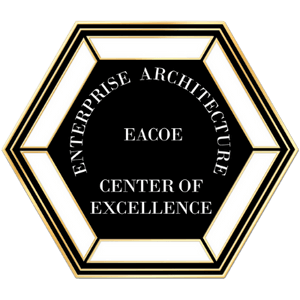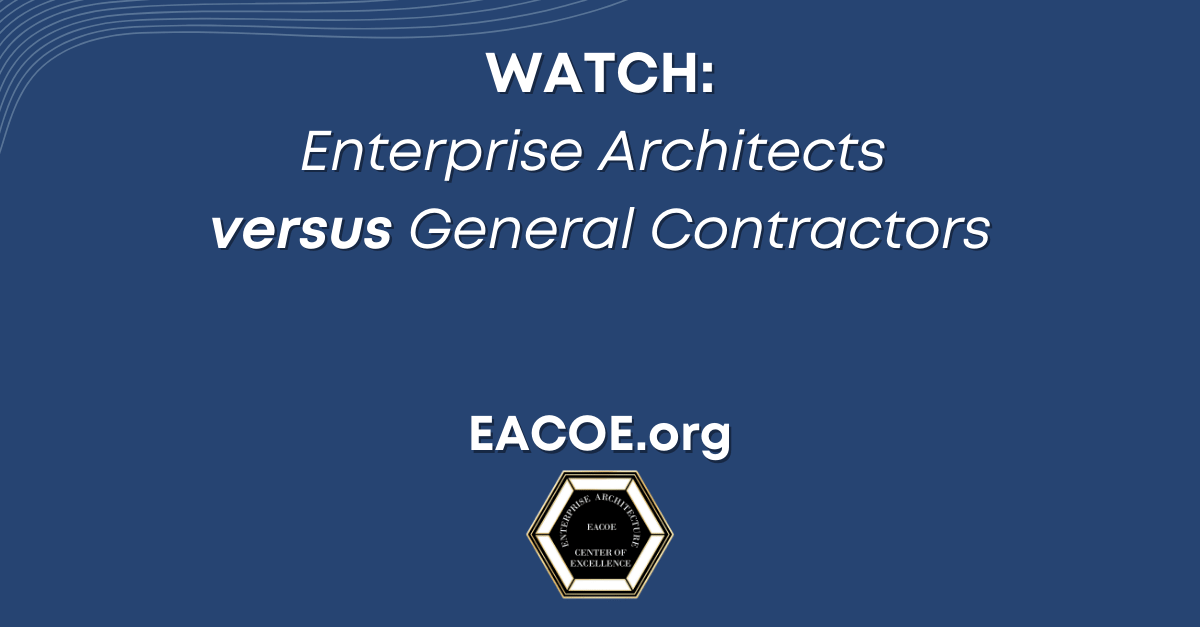Enterprise Architect Job Description
If you want to download a full copy of the EACOE Enterprise Architect Job Description, go HERE or get access below.
At the EACOE, it is our firm’s mission to advance the Enterprise Architect profession, discipline, and base of understanding. Today, EACOE is the Practitioner-Standard for Enterprise Architects. We are moving the Enterprise Architecture profession to a maturity similar to surgeons, pilots, and architects in the physical world.
What is an Enterprise Architect?
The Enterprise Architect combines many different skills and experiences to address and solve business, information, and technology-related opportunities and problems. In many activities, the Enterprise Architecture developed by the Enterprise Architect is the “glue” that integrates the project and program strategies across multiple programs and projects and ensures alignment with business strategies and drivers, and management priorities.
This “glue” is a series of explicit graphical models that, at a minimum, are “human consumable, define and describe the Goals the Enterprise is trying to achieve, the Processes needed to be performed to meet these Goals, the Things (Data) needed to perform these Processes, and the Organizational alignment and responsibilities in place to perform the required activities. The EACOE Enterprise Architect sets the direction and establishes the approach for integrating information applications and programs.
Finally, the Enterprise Architect catalogs, develops, coordinates, communicates, maintains, and enforces the overall Enterprise Architecture models, representations, initiatives, capabilities, and standard components used by the Enterprise to perform all business and technology-related activities. In contrast, review the Business Architect job description.
What Does An Enterprise Architect Do?
Enterprise Architect Experience:
Normally, a minimum of 7 years of analysis experience is expected.
In addition to the analysis background, the Enterprise Architect will possess a broad background in different sectors, and it is desirable to have experience and knowledge in at least one aspect of the business (for example, engineering, manufacturing, planning, etc.).
This is necessary to allow the Enterprise Architect to dialog with business people and management on their terms.
Finally, and key to this position, the Enterprise Architect should have demonstrated skills and actual examples of models built using The Enterprise Framework™.
A Master’s Degree in a related field is desirable.
Enterprise Architect Skills:
Communication, both verbal (e.g., presentations, seminars, etc.) and written (e.g., reports, articles, etc.).
Group session facilitation.
Team leadership.
Marketing (“selling” the results of architectural approaches through presentations).
Analysis and design.
Modeling and graphical representations and abstractions. Actual experience developing and building models based on The Enterprise Framework™.
Management (e.g., prioritization, trade-off analysis, psychology, etc.).
Roles of Enterprise Architects:
The Enterprise Architect will be involved in programs with the following roles. While the following is not exhaustive, it does represent some of the key roles:
The Architect for cross-program, and cross-project Architecture strategies, opportunities, and problem resolution
The Architect for complex development projects
The consultant in business process analysis and design, and service delivery, particularly with respect to the use of information, trends, and directions
The project “auditor” to ensure conformance and compliance of projects and programs with Architect guidelines. Essentially the “voice of the customer” during development activities.
Enterprise Architect Responsibilities:
The successful Enterprise Architect will have many responsibilities. While the following is not exhaustive, it does represent some of the key responsibilities:
Definition, implementation, and execution of the processes for the definition, maintenance, and conformance management of the Enterprise Architecture.
Update and maintenance of the key Enterprise Architecture deliverables.
Establishment and maintenance of contacts within business units and information system programs to understand business activities and business drivers, business requirements, solutions strategies, alternatives, etc., being considered and/or implemented.
Architectural leadership in the resolutions of inter-program and inter-project issues.
On-going publicity and communication of the Enterprise Architecture both within the information community and the business units.
Ongoing research and assessment of new analysis approach for potential use within the Enterprise.
For the rest of the Job Description, fill out the form below.
Specific duties of Enterprise Architects
The Enterprise Architect is responsible for the development or coordination of the following deliverables:
Developing the Enterprise Architecture
Coordinating all Enterprise Architecture activities locally and globally
Developing and coordinating Architecture Plans
Assisting in aligning business and enterprise initiatives with the Enterprise Architecture
Auditing compliance within the Enterprise Architecture standards
Serving as an advisor to senior business management on business and information integration strategies
Enterprise Architect vs. General contractor
EACOE is the Practitioner-Standard for Enterprise Architects.
In this era of business change, the need to link sound corporate strategy and information strategy has never been greater. Technical strategies alone are not capable of ensuring alignment and providing business value.
To benefit from the information resources that are key to your organization's growth, it is essential to have an Enterprise Architecture aligned with your Business Strategy that aligns with your Business Goals and is capable of effectively addressing and managing risk.
EACOE Certified Enterprise Architecture professionals are the highest quality practitioners. They are the industry’s premium enterprise architects with helping ensure your enterprise’s success. Organizations employing or contracting EACOE Certified Enterprise Architects understand the need for professionals who have credentials that are known and respected around the world.
Our Certified Enterprise Architecture professionals can help ensure your enterprise’s success. They have the proven ability to perform Enterprise Architecture activities with globally accepted standards and guidelines to ensure that the enterprise’s information technology and business systems are aligned with Business Goals, are capable of change in continually changing business and technology climates, can reuse enterprise systems assets, and are cost-effective.
Enterprises are in search of practitioners that are up to date with current proven practical practices and are committed to their profession. EACOE Enterprise Architect Certification are these practitioners, and these professionals maintain skills that are imperative in today’s competitive environment.
EACOE Certified Enterprise Architects have committed to maintaining skills, following a professional path that continually allows for skills enhancement and demonstration, knowledge gain, and professional development, and are distinguished from other Enterprise Architects.
Our Enterprise Architects with advanced certifications have demonstrated Enterprise skills, attended a rigorous education and training course, continue to demonstrate skills by periodic re-certification, and have the desire to be leaders in their profession.
Educate, train, and certify in Enterprise Architecture with EACOE’s Practitioner Enterprise Architect Workshop. Register for the workshop HERE.

